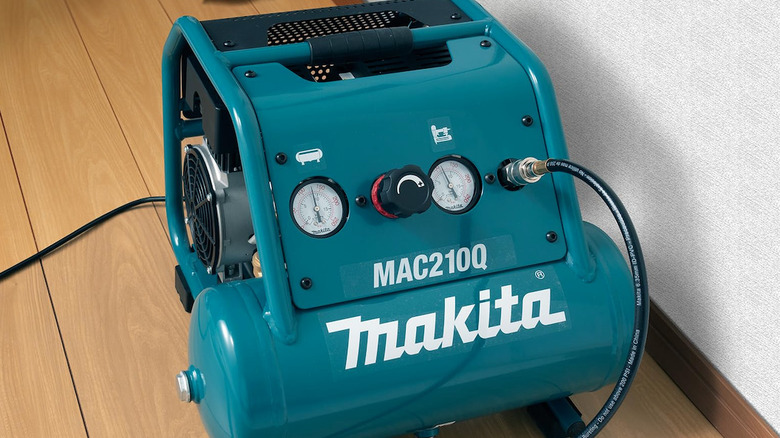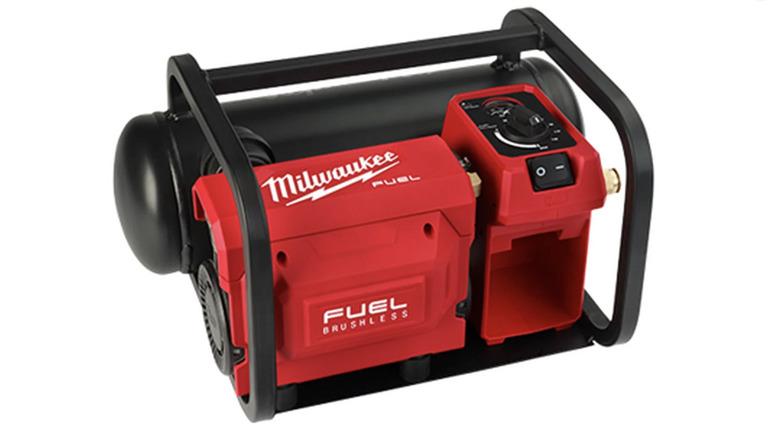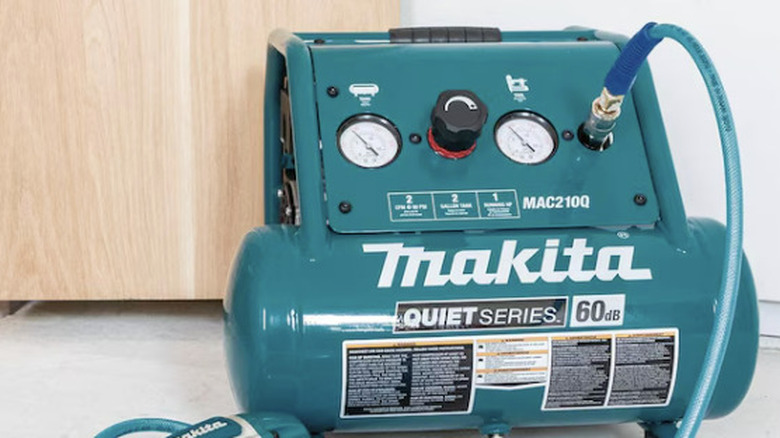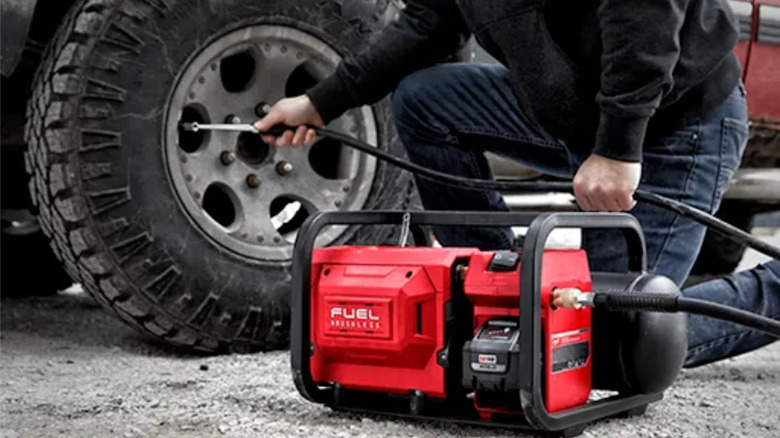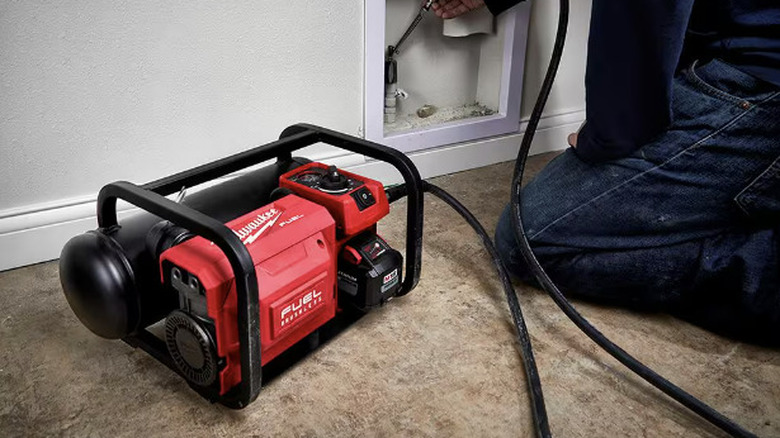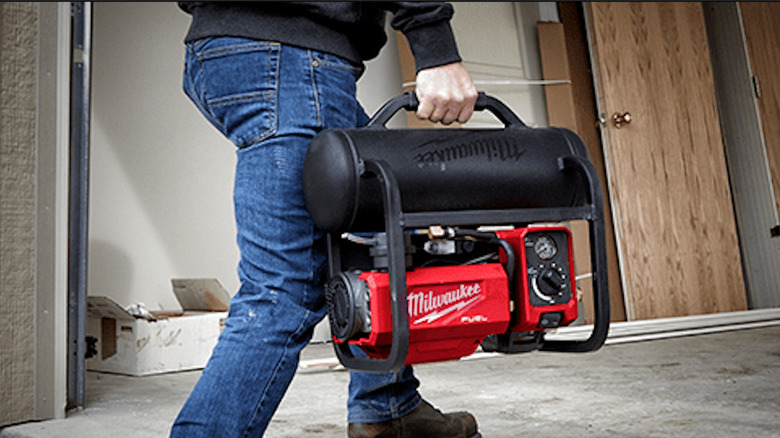Makita's 2 Gallon Electric Air Compressor Vs. Milwaukee's: What's The Difference?
We may receive a commission on purchases made from links.
Air compressors can be invaluable on a jobsite or for certain DIY projects around the house. In addition to supplying power to a wide range of pneumatic tools, like nail guns, staplers, impact wrenches, and spray guns, they can also be used in a number of other ways. This includes using compressed air to clear dust and debris from workspaces and/or out of equipment, or for flushing out or testing HVAC systems or water pipes.
Since they're so useful and easy to find on many jobsites, it shouldn't be a surprise that air compressors are manufactured and sold by many major tool brands. In the SlashGear air compressor buyers' guide for top brands and affordable picks, two of the listed brands include Makita and Milwaukee Tool. If you've been shopping around for a mid-sized air compressor that you can bring from jobsite to jobsite or easily move around the house, you may have narrowed down your options to two products offered by these companies: the Makita Quiet Series 1 HP, 2 Gallon, Oil‑Free, Electric Air Compressor and the Milwaukee M18 Fuel 2 Gallon Compact Quiet Compressor.
While both these tools perform the same general functions, there are differences between the two. Here's a comparison of Makita's and Milwaukee's air compressors that takes a deeper look at the features of both. In addition to the listed specs provided by the manufacturers on their websites, the hands-on reviews of multiple reputable sources were used to create this breakdown. More detailed information on how these air compressors were evaluated can be found at the end of the comparison.
What is the Makita Quiet Series 1 HP, 2 Gallon, Oil‑Free, Electric Air Compressor?
The Japan-based tool manufacturer Makita makes several different air compressors, in addition to various smaller-scale air inflators. These range in size from larger, more heavy-duty options to compact models, delivering power between one-half horsepower to three horsepower. The Makita Quiet Series 1 HP, 2 Gallon, Oil‑Free, Electric Air Compressor, which has product code MAC210Q, sits somewhere in the middle of this range, and is intended for use indoors, such as for trim and finish carpentry, cabinet or furniture making, or case and base installation. It could also be used for other applications, including for plumbing, but it wouldn't be ideal for heavier-duty tasks, like blowing out sprinkler lines when it's time to winterize your landscaping setup.
It's also extremely useful for powering your pneumatic tools, and is one of the best Makita tools to complete your workshop pneumatic setup. If you're thinking about purchasing Makita's Quiet Series 1 HP, 2 Gallon, Oil‑Free, Electric Air Compressor, it retails for $229 from Home Depot and $314 at Acme Tools.
What is the Milwaukee M18 Fuel 2 Gallon Compact Quiet Compressor?
Unlike Makita, which offers several different-sized air compressors with various power levels, the Milwaukee Electric Tool Corporation has only one model in its inventory, besides various smaller-scale air inflators meant for filling tires and the like. This sole model, the Milwaukee M18 Fuel 2 Gallon Compact Quiet Compressor, has product code 2840-20, and was recently included in SlashGear's list of new Milwaukee tools to add to your DIY workshop. Like Makita's 2 Gallon electric air compressor, Milwaukee's option is great for use indoors, as well as certain outdoor applications such as refilling larger tires.
If you've purchased power tools from Milwaukee before, you're probably aware that the brand's products tend to be a little more expensive than other brands like DeWalt or Craftsman. The manufacturer's sole air compressor is no exception, and is sold by Home Depot and Ace Hardware for more than Makita's Quiet Series 1 HP, 2 Gallon, Oil‑Free, Electric Air Compressor, with a list price of $379. However, you can find it at the slightly more affordable price from Walmart or Amazon, as well.
How are Makita's and Milwaukee's air compressors powered?
One big difference between Makita's and Milwaukee's 2 gallon air compressors is the way they're powered. Makita's electric air compressor is corded, and can be used with most household or outdoor AC power outlets. The Milwaukee M18 Fuel compressor, on the other hand, is cordless and battery-powered. As part of Milwaukee's M18 tools system, it can be powered by the same interchangeable batteries and chargers as over 250 other tools and products manufactured by the brand.
There are pros and cons to both of the power methods used by Makita and Milwaukee for these products. An obvious advantage to using Milwaukee's cordless option is the enhanced portability, as you aren't constrained by power outlets and can use the compressor wherever you'd like. However, with Makita's corded tool, you'll never have to worry about running out of juice in the middle of a task or have to constantly monitor battery life and recharge power packs.
Plus, the price of Milwaukee's tool rises when you factor in the cost of the necessary battery and charger. Milwaukee is already, in general, pricier than many tool brands, and the kits that include batteries and/or chargers make that price difference even more apparent. A bundled kit that pairs the Milwaukee M18 Fuel 2 Gallon Compact Quiet Compressor with a 5 Ah battery is available for $479, while another kit that includes a more powerful 8 Ah battery, as well as a charger, costs over $600. Ultimately, which product is best for you may come down to whether you already own several Milwaukee M18 tools. If you already have batteries and chargers that are compatible with Milwaukee's air compressor, this added cost won't be an issue.
What features are different between the Makita and Milwaukee air compressors?
One of the most important features Makita and Milwaukee highlight with their air compressors is how quietly they run — the word "quiet" is right there in the name of both products. However, Makita's is slightly quieter, as it can run at as low as 60 decibels, just beating out Milwaukee's 68 decibels. Both have ergonomic grips and are designed for portability, though Milwaukee's cordless compressor weighs less.
Makita's electric air compressor utilizes a lever-handle tank drain for easy air tank release and can fill up in 65 seconds, while Milwaukee's takes about 90 seconds to fill to capacity. Makita's product is built with a roll-cage construction for enhanced durability, includes large, easy-to-read gauges, and runs at 1,750 rpm. Milwaukee's brushless motor can provide enough pressure to power 1,600 nails per charge. It's designed with a single turn regulator to allow for safe and efficient control and adjustments to output pressure.
Both tools have the same 2 gallon capacity, as well as the same maximum tank pressure — 135 psi. However, Makita can deliver 2 CFM at 90 psi, while Milwaukee tops out at 1.2 CFM at 90 psi. It should be noted that both tools are medium-powered compressors and won't be ideal for heavier-duty tasks or powering larger pneumatic tools.
Which air compressor has better reviews?
It's one thing to compare and contrast two similar tools by the specs and features listed by their manufacturers, but it's also a good idea to take a look at reviews and see if these products can actually do what they're advertising. The best reviews are those from craftsmen and tool experts who have actually used or field tested the equipment. After testing several different portable air compressors, Bob Vila named the Makita Quiet Series 1 HP, 2 Gallon, Oil‑Free, Electric Air Compressor its "Best Compact" model, highlighting its light weight, small size, and low-decibel output. However, the hands-on review noted that the tool lacked the power or capacity to run larger tools.
After Pro Tool Reviews tested the Milwaukee M18 Fuel 2 Gallon Compact Quiet Compressor in both plumbing and carpentry applications, the publication gave the tool a positive review, calling it powerful, quiet and convenient. It listed its weight as a drawback, though it should be noted that it's significantly lighter than Makita's compressor. Tool Box Buzz echoed how impressively quiet the tool is in its review, though mentioned that — while it fits nicely atop Milwaukee's Packout boxes — it's not compatible with the brand's convenient modular storage system.
The ratings and reviews offered by Home Depot customers generally fall in line with the positive impressions both tools have from the professionals. Based on over 250 user ratings, Makita's electric air compressor has an average 4.8 out of five customer score, with a whopping 97% of these Home Depot customers recommending the product. Milwaukee's cordless compressor, meanwhile, has a solid 4.6 out of five user rating based on over 1,050 reviews, with 91% of the Home Depot customers recommending it.
How were these air compressors evaluated?
To accurately compare and contrast the specs and features of the Makita Quiet Series 1 HP, 2 Gallon, Oil‑Free, Electric Air Compressor and Milwaukee M18 Fuel 2 Gallon Compact Quiet Compressor, several online sources were referenced. This includes the listed specs provided by Makita and Milwaukee on the manufacturers' websites, as well as those listed by major hardware trailers that sell the tools, like Home Depot. To ensure the tools actually live up to the specs provided by their respective brands and that the included features work as intended, several hands-on reviews by reputable sources were also consulted.
These publications have established reputations for their tool and hardware reviews and often use professional craftspeople and contractors to vigorously field test products before writing their reviews. The publications sourced for this comparison include Bob Vila, Tool Box Buzz, and Pro Tool Reviews. Additionally, feedback and user reviews from Home Depot customers who've purchased and used these compressors were also referenced for this comparison piece. Home Depot was selected because, as a major retailer that sells both products, there is a large base of customers that input their personal feedback after using the tools. The larger the base of customers used, the less likely these general opinions will be affected by reviews made in bad faith, whether positively or negatively.

